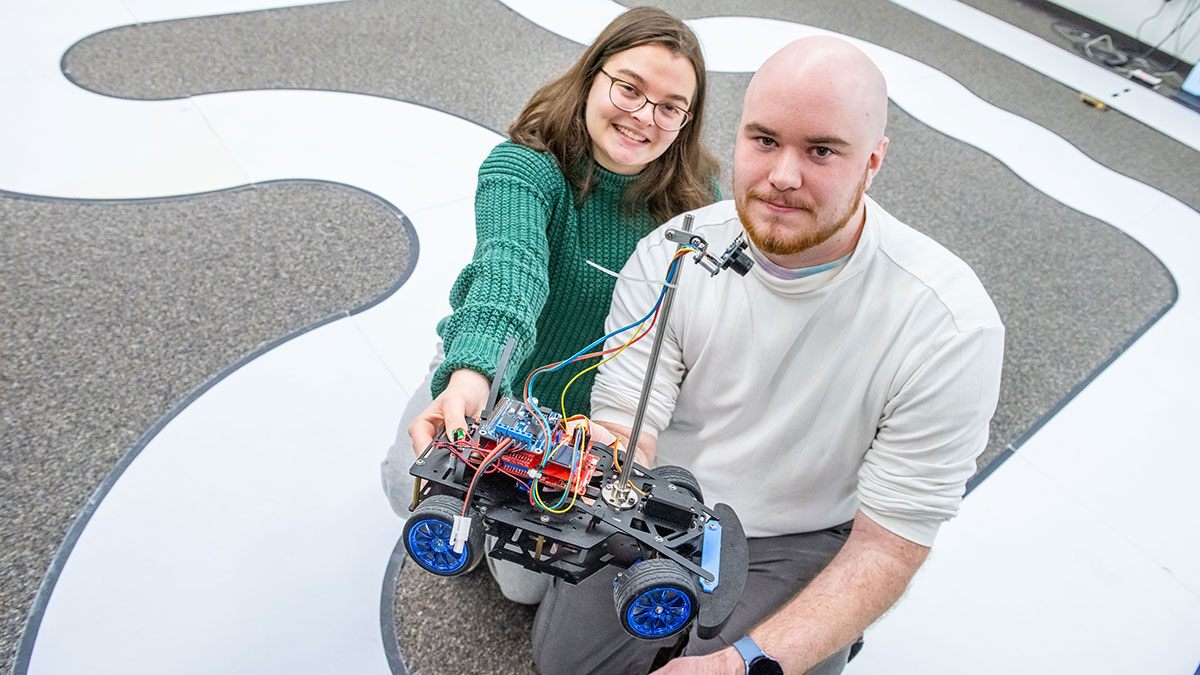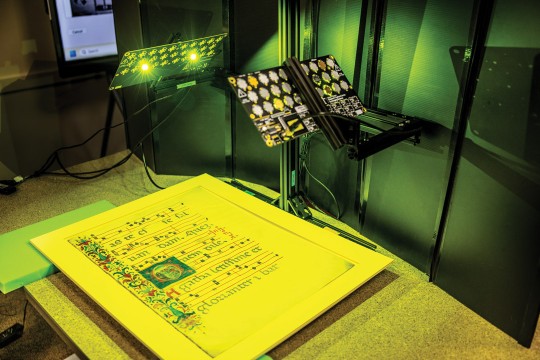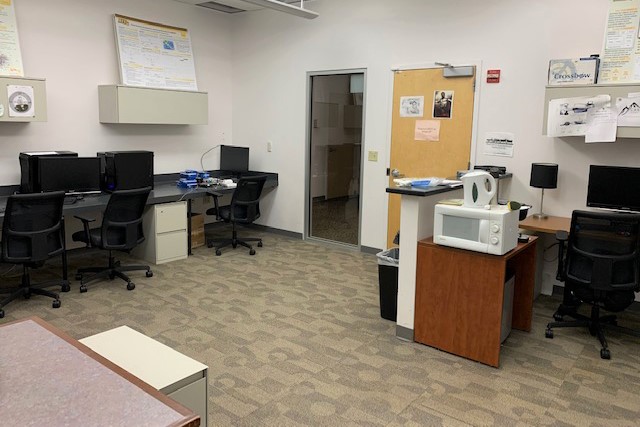Department of Computer Engineering

Department of
Computer Engineering
- RIT/
- College of Engineering/
- Academics/
- Departments/
- Computer Engineering
Contact
Roy Melton, Associate Department Head
585-475-7698, Roy.Melton@mail.rit.edu
Andres Kwasinski, Graduate Program Director and Electrical and Computer Engineering Ph.D. Program Director
585-475-5139, ak@mail.rit.edu
Alyssa Andres, Senior Staff Specialist
585-475-2987, axaeec@rit.edu
Overview
Nearly everything we touch each day – from coffee machines to cars, smartphones, and wearable devices – is powered by computing systems designed and built by computer engineers. Computer engineering impacts every aspect of our lives. Sensors and networking technology allow for the management of logistics and the inventory systems that facilitate access to the foods and products necessary to daily life. Today’s vehicles are equipped with multiple computing subsystems that control engine operation, performance, navigation, autonomy and much more. Hospitals and health care providers increasingly rely on computer engineering systems to provide medical services from administrative tasks to microsurgery using robotic arms. Computers specially designed for Artificial Intelligence, Big Data and massively parallel tasks that are both reliable and secure are the need of the hour.
Computer engineering offers opportunities for all types of designs and innovations, such as designing the architecture of a new computer, integrating electronics and sensors into a new embedded system, or controlling the smart grid. There is a great demand for computer engineers who can do it all—from designing computer hardware, components and software, to developing next-generation products and appliances that contain computing systems of all sizes and scales ranging from microchips to data centers. As computer technology becomes more essential to commerce and daily life, companies will need computer engineers who possess a well-developed set of skills and who can quickly adapt to change. To meet the challenges of the future, these companies will turn to computer engineers for innovative solutions and technological leadership.
Mission
The computer engineering program mission is “to provide outstanding career-oriented education in computer engineering and engage students in leading edge research.”
The computer engineering program mission is dedicated to furthering RIT’s mission to prepare students for successful careers “through a unique blend of curricular, experiential, and research programs delivered within a student-centric culture." In addition, the computer engineering program’s mission is consistent with the goals of the Kate Gleason College of Engineering. These include the college’s focus to:
- educate students to meet the immediate and future needs of industry and to support the intellectual development and growth of its graduates throughout their careers;
- perform research that is focused on providing viable solutions to the real-world problems facing our global society; and
- partner with industry to accelerate economic growth both regionally and nationally.
Accreditation
The BS degree in computer engineering is accredited by the Engineering Accreditation Commission of ABET, www.abet.org. For Enrollment and Graduation Data, Program Educational Objectives, and Student Outcomes, please visit the college’s Accreditation.
14
Full-time faculty members from 9 countries
6
International Academic Partner Institutions
5
Affiliated Ph.D. Programs
Degree Programs
Undergraduate Degrees
RIT’s Computer Engineering BS – AI Option builds hardware–software expertise and AI skills in generative AI, deep learning, and neuromorphic computing.
Learn more about the Artificial Intelligence Option - Computer Engineering BS programWith RIT’s computer engineering BS, you’ll design hardware, components, and software for next-generation products, including autonomous vehicles and wearables.
Learn more about the Computer Engineering BS programIn RIT’s secure systems option, you’ll gain the knowledge, skills, and perspective needed to develop, analyze, and implement secure hardware and software systems.
Learn more about the Secure Systems Option - Computer Engineering BS programGraduate Degrees
Explore the human mind through psychology, neuroscience, AR, and more in RIT’s interdisciplinary Ph.D.
This degree program is offered jointly between the College of Liberal Arts, the Kate Gleason College of Engineering, the Golisano College of Computing and Information Sciences, the College of Science, and the National Technical Institute for the Deaf.
Learn more about the Cognitive Science Ph.D. programRIT’s Computer Engineering MS focuses on design methodology and advanced engineering tools for developing computer-integrated systems.
Learn more about the Computer Engineering MS programThe electrical and computer engineering Ph.D. gives engineers the tools to transform the world by leading trailblazing research that expands and creates knowledge.
Learn more about the Electrical and Computer Engineering Ph.D. programIn RIT's microsystems engineering Ph.D., you’ll conduct research in nano-engineering, design methods, and technologies for micro- and nano-scaled systems.
Learn more about the Microsystems Engineering Ph.D. programMinors and Immersions
Students gain a foundation in digital systems design, an understanding of computer organization, and an introduction to embedded systems programming. They also build on this core through elective courses in the areas of hardware design, architectures, networks and systems.
Learn more about the Computer Engineering Minor programResearch
Research within the department of computer engineering reflects the fundamental role of computing in today’s information age, addressing a broad span of technological challenges that include securing the cyber-physical space, improving industrial processes by integrating Internet-of-Things devices, and harnessing the Artificial Intelligence revolution by bringing to life self-driving vehicles and new computing paradigms. Through participation in cross-disciplinary Ph.D. programs in Electrical and Computer Engineering, Computing and Information Sciences, Microsystems Engineering, and Imaging Science, the research activities reflect the diversity of computer engineering. Faculty members and students from the Department of Computer Engineering are actively engaged in various projects funded by federal and state agencies, as well as industry. Current research within the Department of Computer Engineering is organized into the following tracks:
This track deals with hardware resource management, instruction set architectures and their close connection with the underlying hardware, as well as the interconnection and communication of those hardware components. Some of the current computer architecture challenges that are being tackled in the Department of Computer Engineering include energy efficient architectures, high performance architectures, quantum computing, graphic processing units (GPUs), reconfigurable hardware, chip multiprocessors, and Networks-on-Chips.
Faculty working in this track:
Modern processors demand high computational density, small form factors, and low energy dissipation with extremely high performance demands. This is enabled by the nanoscale and heterogeneous integration of transistors and other emerging devices at the massive-scale. This research track focuses on designing computers with emerging novel technologies in the presence of severe physical constraints; investigating dynamic reconfigurability to exploit the power of nano-scale electronics for building reliable computing systems; solutions for post Moore’s Law computing, such as neuromorphic technology, and studying the applicability of emerging technologies to address challenges in computing hardware of the future.
Faculty working in this track:
The prevalence of networked computing devices of all sizes and uses have transformed our way of life. Ubiquitous access to data through these devices with reliable performance and security assurance while meeting end-user quality of experience expectations presents exciting challenges for engineers and scientists. Adaptability to meet the demands from ever-increasing data traffic, and resilience to environmental uncertainty, system failures and cyber-attacks requires advances in hardware, software and networking techniques, as well as the application of innovative transformative technologies, such as machine learning. This research track focuses on intelligent wireless and sensor networks, cryptographic engineering, and predictive cyber situation awareness.
Faculty conducting research in this track are actively engaged in RIT’s ESL Global Cybersecurity Institute.
Faculty working in this track:
Visual information is ubiquitous and ever more important for applications such as robotics, healthcare, human-computer interaction, biometrics, surveillance, games, entertainment, transportation and commerce. Computer Vision focuses on extracting information from image and video data for modeling, interpretation, detection, tracking and recognition. Machine Intelligence methods deal with human-machine interaction, artificial intelligence, agent reasoning, and robotics. Algorithm development for these areas spans image processing, pattern recognition and machine learning, and is intimately related to system design and hardware implementations.
Faculty conducting research in this track are actively engaged in RIT’s Center for Human-aware Artificial Intelligence (CHAI).
Faculty working in this track:
This research area is concerned with algorithms and devices used at the core of system that interacts with our physical world. As such, this area considers the sensing, analysis and modeling of dynamic systems with the intent of measuring information about a system, communicating this information and processing it to adapt its behavior.
Faculty working in this track:
Featured Work and Profiles
-
RIT Research Minute: DNA Computing
Amlan Ganguly DNA molecules and computing? RIT computer engineering department head, Amlan Ganguly and his research team are working to change DNA for more sustainable and effective computing.
Read More about RIT Research Minute: DNA Computing -
RIT Professor Drives Quantum Computing Advancements with New NSF-Funded Research
Dr. Sonia Lopez Alarcon has received a prestigious NSF grant to develop advanced compilation strategies for quantum computing, aiming to improve qubit routing scalability and reliability.
Read More about RIT Professor Drives Quantum Computing Advancements with New NSF-Funded Research -
Professor Awarded NSF Early Career Grant for Sustainable Methane Conversion
Chemical engineering professor Obioma Uche has received an NSF Early Career Award to explore new catalysts that could convert methane into ethylene more efficiently,
Read More about Professor Awarded NSF Early Career Grant for Sustainable Methane Conversion -
Researcher Heads Team to Develop DNA-Based Processor for Future Tech
RIT’s Amlan Ganguly and his team have developed a groundbreaking system that leverages DNA for data storage and processing, offering a compact and sustainable alternative to traditional data centers.
Read More about Researcher Heads Team to Develop DNA-Based Processor for Future Tech -
Professor Explores AI’s Impact on the Future of Digital Art in Hollywood
Professor Shaun Foster highlights how AI tools are transforming art creation, speeding up processes, and democratizing content while emphasizing the need for ethical considerations and human...
Read More about Professor Explores AI’s Impact on the Future of Digital Art in Hollywood -
Professor Deese Champions Human Creativity Over AI in Screenwriting
Professor Frank Deese argues that while AI can assist in the storytelling process, it cannot replace the unique emotional depth and originality that human screenwriters bring to the craft.
Read More about Professor Deese Champions Human Creativity Over AI in Screenwriting
Latest News
-
November 19, 2025

RIT innovation helps illuminate lost history
The goal of libraries, museums, and archives around the world is to safeguard historical documents, but some objects can deteriorate with time. RIT’s Cultural Heritage Imaging (CHI) lab is using funding from the National Endowment for the Humanities to develop a relatively low-cost system that makes cultural heritage imaging methods more accessible.
-
November 19, 2025

Manifesting quantum: How RIT researchers are navigating the next frontier of physics
RIT researchers are zeroing in on quantum photonics, the creation, control, and detection of light. Photonics has long been a specialty of the university. RIT led the team that developed the first quantum photonic wafer, which is key to the future of mass-produced quantum communication systems.
-
May 30, 2025

Quantum Machine Learning Predicts Suitability of HHL Algorithm for Equations
Quantum Zeitgeist features research by Sonia Lopez Alarcon and Cory Merkel, associate professors in RIT's Department of Computer Engineering, and Mark Danza '25 MS (computer engineering).
Student Resources
The computer engineering department offers a variety of resources for our students, including academic support, curriculum flow charts, handbooks, and more. Visit our Student Resources page for more information.



























